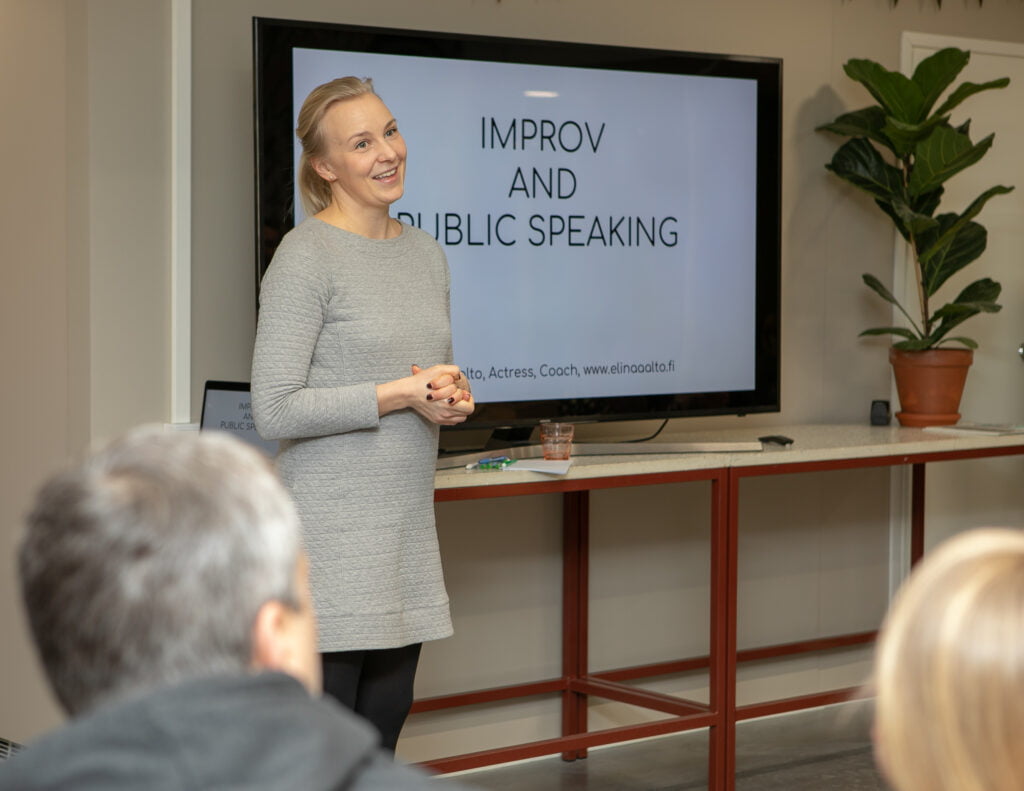On Waffle Wednesday 13.2.2019 Elina Aalto was here to talk to us about performing and how we can get over performance anxiety. Elina has over 14 years of experience in performance, communication and improvisation training. According to her, each of us can overcome anxiety and learn to get in better contact with the audience through improvisation, which is not meant as a tool only for the actors; Using the principles of improvisation, we can all become more confident performers.
Each of us has improvised
In fact, we are constantly improvising in our daily lives. As we listen to the talk of our colleagues or friends, we improvise, because we still do not know how we react to the speech. Improvisation is therefore not limited to theater; it happens constantly and everywhere.
Improvisation and performance scare many of us. This fear is well explained by the example in which a human is put to walk along the plank. In the first scenario, the plank is on the floor; walking along they dare to boldly fool around, jump or even dance. In the following, the plank is raised high and drop could lead to injury or death; in that case, when walking over it, the person stays rigid and comes to the other end with a spirit of restraint. The same thing happens when we are afraid of performing. We are so afraid of failure or that the listeners don’t like us so we become rigid in front of the audience.
For example, while we have a presentation, we are nervous that we forget the words, we lose our voice that we cannot answer the questions of the public, that we freeze or blush. We see all of these as failures, although in fact all of these are things that we can easily do while having a presentation. It’s human. We should accept that something can always happen, no matter how we try to be perfect. The biggest problem with the tension associated with performing is that when we get stiff in front of the audience, we lose all contact with the listeners. In fact, failure occurs only as an opportunity to strengthen the bond with the audience. Failure is human and people understand it; in the best case, the audience can laugh at what happened, instead of trying to hide the mistake.
Elina’s tips for performing:
- Be a little ‘bigger version of yourself’. Be yourself, but a little “bigger”: laugh more, make your gestures higher and be more energetic. This is how you make a good impression on the audience, but still remain yourself.
- Improvisation says that “failure is a gift”. If you accept that you will fail – the less time you spend on thinking and the less likely you are to fail.
- If the speaker is excited and positive, so is the audience. Likewise, if the speaker is fearful and anxious, this will also happen to the audience.
- If you speak monotonously to the public, it may be difficult to maintain interest. If you find that the audience starts browsing their phones, you have to do something about it. The performer must always react to their audience. Activating the public in one way or another is always a good way to make them interested in the presentation.
- Improvise, communicate with the audience. Be present and always take eye contact with the audience.
- Instead of learning the speech by heart, try telling it with your own words. Tell stories and examples. Practice sharing your presentation first with your loved ones or colleagues. Be assertive, you have all the information you need. You know this very well! You’ll find a good way to tell your audience.
- It is good to practice speaking always and wherever you can. Have a talk on birthdays, family celebrations, dinner with family, or even having lunch with colleagues. You can practice spontaneous minute-long speech anywhere.
- Improvise. Make unfamiliar familiar. Be brave!
Finally, we all got a pen and paper that we had to write a “courage task” for some other participant. We exchanged tasks with each other, and each got a homework assignment. Here are a few examples of the tasks we wrote: “Keep a spontaneous speech to your family / friends”, “Contact your old friend” and “Praise someone’s unknown appearance / presence”. What kind of “courage task” can you challenge yourself today?

